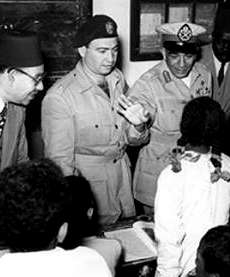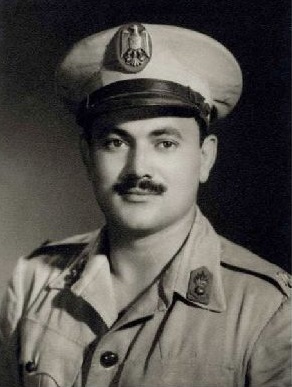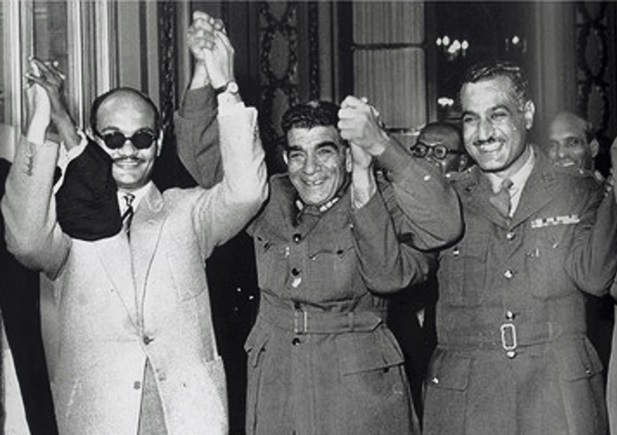|
Declaration Of The Republic
The Declaration of the Republic was a constitutional declaration issued by the Revolutionary Command Council of Egypt on June 18, 1953. The Declaration dethroned King Fouad II and transitioned the Kingdom of Egypt to the Republic of Egypt. Timeline * The Egyptian Revolution of 1952 demanded that King Farouk abdicate to his son and heir apparent, Prince Ahmed Fouad, and leave the country before 18:30 on July 26, 1952. * On December 10, 1952, the dissolution of the Constitution of 1923 was announced by the Revolutionary Command Council. * On January 15, 1953, the Revolutionary Command Council abolished political parties and specified a transitional period of three years. * On February 10, 1953, the Council issued a constitutional declaration publicizing the provisions for an interim constitution. * On June 18, 1953, the Republic was declared which abolished the monarchy and ended the 148 year rule of the Muhammad Ali Dynasty with Muhammad Naguib becoming the first President ... [...More Info...] [...Related Items...] OR: [Wikipedia] [Google] [Baidu] |
Gamal Abdul Nasser
Gamal Abdel Nasser Hussein (15 January 1918 – 28 September 1970) was an Egyptian military officer and revolutionary who served as the second president of Egypt from 1954 until his death in 1970. Nasser led the Egyptian revolution of 1952 and introduced far-reaching land reforms the following year. Following a 1954 assassination attempt on his life by a Muslim Brotherhood member, he cracked down on the organization, put President Mohamed Naguib under house arrest and assumed executive office. He was formally elected president in June 1956. Nasser's popularity in Egypt and the Arab world skyrocketed after his nationalization of the Suez Canal and his political victory in the subsequent Suez Crisis, known in Egypt as the ''Tripartite Aggression''. Calls for pan-Arab unity under his leadership increased, culminating with the formation of the United Arab Republic with Syria from 1958 to 1961. In 1962, Nasser began a series of major socialist measures and modernization refo ... [...More Info...] [...Related Items...] OR: [Wikipedia] [Google] [Baidu] |
Khaled Mohieddin
Khaled Mohieddine (, ; August 17, 1922 – May 6, 2018) was an Egyptian military officer, revolutionary and politician. As a member of the Free Officers Movement, he participated in the toppling of King Farouk that began the Egyptian Revolution of 1952, and led to the establishment of the Republic of Egypt. Mohieddine held important political and media roles throughout Gamal Abdel Nasser's presidency, although the two also had a number of fallings out. An outspoken individual, he was one of the few members of the revolutionary inner circle of Egypt able to disagree passionately with Nasser whilst still retaining Nasser's respect and admiration. His political influence diminished during the early part of Anwar Sadat's presidency until he cofounded a leftist political party, National Progressive Union Party (Tagammu), in 1976. Under Mohieddine's leadership, Tagammu became a significant opposition force during Hosni Mubarak's rule. Early life Mohieddine was born in Kafr Shuk ... [...More Info...] [...Related Items...] OR: [Wikipedia] [Google] [Baidu] |
Hassan Ibrahim
Hassan Ibrahim (; 1917– 1990) was an Egyptian Air Force officer and one of the founders of the Free Officers movement. Early life and education Ibrahim was born in Alexandria in 1917. He graduated from the Egyptian Air Academy in 1927. Free Officers Movement Ibrahim was among five military officers who formed the first cell of the Free Officers movement in July or September 1949. Although it is argued that Ibrahim along with other officers was a member of the Muslim Brotherhood's special unit from 1944 to 1945, there is another report stating that Ibrahim was part of the group called Young Egypt. In addition, Ibrahim was one of the nine-member leadership group of the Free Officers movement. The movement led the 1952 Revolution. Then Ibrahim became a member of the 14-member Revolution Command Council that was charged with the running of Egypt following the success of the revolution. Career Ibrahim participated in the Palestinian war in 1948. In 1952 he served as an Air Force ... [...More Info...] [...Related Items...] OR: [Wikipedia] [Google] [Baidu] |
Squadron Leader
Squadron leader (Sqn Ldr or S/L) is a senior officer rank used by some air forces, with origins from the Royal Air Force. The rank is used by air forces of many countries that have historical British influence. Squadron leader is immediately senior to flight lieutenant and immediately below wing commander. It is usually equivalent to the rank of lieutenant commander in the navy and of the rank of major in other services. The equivalent rank in the Women's Auxiliary Air Force, Women's Royal Air Force (until 1968) and Princess Mary's Royal Air Force Nursing Service (until 1980) was "squadron officer". Squadron leader has also been used as a cavalry command appointment (UK) and rank (France) since at least the nineteenth century. In Argentina it is used as a command appointment by both the army's cavalry and by the air force's flying units. The cavalry rank of squadron leader in France is equivalent to a major, and the cavalry appointment of squadron leader in the UK gene ... [...More Info...] [...Related Items...] OR: [Wikipedia] [Google] [Baidu] |
Kamal El-Din Hussein
Kamal El-Din Hussein (; 2 January 1921 – 19 June 1999) was a member of the Egyptian Free Officers who overthrew King Farouk. Early life and education Kamal El-Din Hussein was born in 1921 in Banha, Qalyubia. He was admitted to military college in 1937. In 1939 he received the bachelor's degree of military science from the Egyptian Military Academy. He served in the field artillery unit in the Western Desert, to fight with the British against the advancing army under Rommel in World War II. Political career Hussein was a founding member of the Free Officers, and his rank was major during his membership to the group. He was appointed member of the Egyptian Revolutionary Command Council after the 1952 Revolution. During the presidency of Gamal Abdel Nasser he was named the president of the teachers' syndicate. He was also appointed minister of social affairs in 1954. He was named the minister of education in late 1957 following the elections in October. In February 1958 ... [...More Info...] [...Related Items...] OR: [Wikipedia] [Google] [Baidu] |
Salah Salem
Salah Salem () (September 25, 1920 – February 18, 1962) was an Egyptian military officer and politician who was a prominent member of the Free Officers Movement (Egypt), Free Officers Movement that orchestrated the Egyptian Revolution of 1952. Early life and military career Salem was born in 1920 to an Egyptian family in Sinkat, Sudan, Sinkat, Sudan, which was a colony ran by Egypt and Britain under a Condominium (international law), condominium, at the time. He was raised in the Hilmiyyat Gadida neighborhood of Cairo, where he was educated at the Ibrahimiyyeh School. In 1938, he graduated from the Egyptian Military Academy, Royal Egyptian Military Academy. He, along with four other future members of the Free Officers Movement (Egypt), Free Officers, was ranked in the top 10 percent of his classes at the General Staff College by 1947. He graduated from college in 1948. That same year, Salem served in the Egyptian and Sudanese army in the Palestine War as an infantry officer ... [...More Info...] [...Related Items...] OR: [Wikipedia] [Google] [Baidu] |
Abdel Hakim Amer
Mohamed Abdel Hakim Amer (, ; 11 December 1919 – 13 September 1967), better known as Abdel Hakim Amer, was an Egyptian military officer and politician. Amer served in the 1948 Arab–Israeli War, and played a leading role in the military coup that overthrew King Farouk in 1952. After leading Egyptian forces in the 1956 Suez war, he was appointed Minister for Defense by President Gamal Abdel Nasser and was Egyptian Vice President between 1958 and 1965. Early life and education Amer was born in Samalut, in the El Minya on 11 December 1919. He was from an affluent family, and his father was a land owner and village mayor. His uncle Mohammed Haidar Pasha served as the minister of war during the reign of King Farouk. After finishing school, Amer attended the Egyptian Military Academy and graduated in 1938. He was commissioned into the Egyptian Army in 1939. Military career Amer served in the 1948 Arab–Israeli War, took part in the 1952 Revolution and commanded ... [...More Info...] [...Related Items...] OR: [Wikipedia] [Google] [Baidu] |
Major (rank)
Major is a senior military Officer (armed forces), officer military rank, rank used in many countries. When used unhyphenated and in conjunction with no other indicators, major is one rank above Captain (land), captain in armies and air forces, and one rank below lieutenant colonel. It is considered the most junior of the senior officer ranks. Background Etymologically, the word stems from the Latin word meaning "greater". The rank can be traced back to the rank of sergeant major general, which was shortened to sergeant major, and subsequently shortened to ''major''. When used in hyphenated or combined fashion, the term can also imply seniority at other levels of rank, including major general, denoting a low-level general officer, and sergeant major, denoting the most senior non-commissioned officer (NCO) of a military unit. The term major can also be used with a hyphen to denote the leader of a military band such as in Pipe-Major, pipe-major or drum-major. Links to major ... [...More Info...] [...Related Items...] OR: [Wikipedia] [Google] [Baidu] |
Hussein El-Shafei
Hussein Mahmoud Hassan el-Shafei (; 8 February 1918 – 18 November 2005) was an Egyptian military officer who was a member of the Free Officers Movement and served as vice president under two Egyptian presidents, Gamal Abdel Nasser and Anwar Sadat. He was one of the nine men who had constituted themselves as the committee of the Free Officers movement and led the country's cavalry corps during the uprising, and was one of only three last-surviving members of the Revolutionary Command Council at the time of his death. Early life and education Born in Tanta in 1918, el-Shafei graduated from the Egyptian Military Academy in 1938. Career El-Shafei was appointed minister of war in 1954 and served as Egypt's minister of labor and social affairs during Egypt's merger with Syria. He served as vice-president under Gamal Abdel Nasser in 1961.During his tenure as minister of social affairs, el-Shafei introduced social insurance reforms considered radical at the time, including pensio ... [...More Info...] [...Related Items...] OR: [Wikipedia] [Google] [Baidu] |
Anwar El Sadat
Muhammad Anwar es-Sadat (25 December 1918 – 6 October 1981) was an Egyptian politician and military officer who served as the third president of Egypt, from 15 October 1970 until his assassination by fundamentalist army officers on 6 October 1981. Sadat was a senior member of the Free Officers who overthrew King Farouk I in the Egyptian Revolution of 1952, and a close confidant of President Gamal Abdel Nasser, under whom he served as vice president twice and whom he succeeded as president in 1970. In 1978, Sadat and Menachem Begin, Prime Minister of Israel, signed a peace treaty in cooperation with United States President Jimmy Carter, for which they were recognized with the Nobel Peace Prize. In his 11 years as president, he changed Egypt's trajectory, departing from many political and economic tenets of Nasserism, reinstituting a multi-party system, and launching the Infitah economic policy. As President, he led Egypt in the Yom Kippur War of 1973 to regain Egypt's ... [...More Info...] [...Related Items...] OR: [Wikipedia] [Google] [Baidu] |
Zakaria Mohieddin
Zakaria Mohieddin (, ; 5 July 1918 – 15 May 2012) was an Egyptian military officer, politician, prime minister of Egypt and head of the first Intelligence body in Egypt, the Egyptian General Intelligence Directorate. Overview Mohieddin attended the Military College in 1938 and was a Staff College graduate in 1948. He was the professional army professor of tactics in the Officers Military College from 1940 to 1943 and again from 1950 to 1951. He was also the professor of tactics in the Officers Staff College from 1951 to 1952. In 1967 following the defeat of Egypt in the Six-Day War, Mohieddin was appointed by president Gamal Abdel Nasser to take over position of president after Nasser's resignation, an appointment he refused. In 1968, Mohieddin resigned from all positions and quit public life. The same year he was arrested due to his alleged involvement in the coup plans against Nasser. As of 2005, after the death of Hussein El-Shafei and until his own death in 2012, ... [...More Info...] [...Related Items...] OR: [Wikipedia] [Google] [Baidu] |




